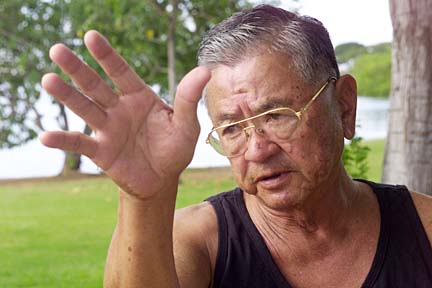

60TH ANNIVERSARY OF THE PEARL HARBOR ATTACK

|
Pearl Harbor Peninsula It was a peaceful Sunday morning for 12-year-old Thompson Izawa and his father, Suyemo, as they rode their bicycles to the shore of the Pearl City Peninsula to fish for papio.
residents recall
wartime discrimination
Japanese Americans were rousted from
their homes and kept isolated for weeksBy Rosemarie Bernardo
rbernardo@starbulletin.comTheir quiet morning turned into chaos as Japanese dive-bombers flew overhead.
"I could hear the high-pitch sound," said Izawa about the torpedo hit on the USS Utah in Battleship Row.
He and his father rushed home three blocks from the shoreline. Within two hours, U.S. soldiers armed with rifles and bayonets forced them and other residents of Japanese descent to board a truck.
"I was afraid," said Izawa, now 72.
All were taken up to the mountains near the Waimano Trail where they slept on the ground overnight and received no food. Three weeks later, the Izawas were allowed to return home, finding their windows shattered and pieces of shrapnel embedded in the wood.
More than 50 years later, 15 Pearl City Peninsula residents of Japanese ancestry received reparations and an apology for being discriminated against by the U.S. government.
Owen Matsunaga, one of the attorneys who helped the Japanese Americans receive reparations from the U.S. government, said the residents of Pearl City Peninsula, across from Ford Island, "were in the line of fire."
Pearl City resident Hazel Kobashigawa Gallipeau, who lived across from the Izawas, was home wrapping Christmas presents on Dec. 7 when she heard Japanese planes flying over her house.
"We couldn't take any clothes," said Gallipeau, who was 15 years old when she spent the night in the mountains with 40 other Japanese evacuees.
"It was raining all night," she added.
Guarded by soldiers in the mountains, Matsunaga said, the evacuees "felt like they were prisoners. There was a lot of fear."
The next morning, the evacuees were transported to the Waipahu Hongwanji Mission, where they were given rice balls to eat.
More than a week passed before Gallipeau was informed by an American Red Cross volunteer that non-Japanese civilians had been taken to a Waipahu ball park on the day of the attack and been given food and shelter.
"The others were treated well but we weren't," Gallipeau said.
Bill Kaneko, past Hawaii chapter president for the Japanese American Citizens League, helped the Japanese evacuees prove they were discriminated against on the basis of their Japanese ancestry.
"Their civil liberties were denied because of their race," Kaneko said.
At first, Japanese residents who were evacuated from their homes after the attack on Pearl Harbor were denied redress under the Civil Liberties Act of 1988 on the grounds that they were not discriminated against based on their racial background.
The U.S. Justice Department's Civil Rights Division later reversed that denial, allowing each resident to receive $20,000 and a letter of apology from the federal government.
Among those who received reparations were Japanese evacuees in Iwilei and Lualualei on Oahu and Puunene on Maui. Japanese Americans who lived in the Pearl City Peninsula were among the last group to receive redress payments, in 1998.
"We were able to convince them (the U.S. Justice Department) there was discrimination involved on how they were not able to return to the area," said Matsunaga.
Statements by non-Japanese residents in the Pearl City Peninsula were key in reversing the appeal, he said.
Ishmael Stagner, who is of Hawaiian and Scottish-Irish descent, was a toddler when the Pearl Harbor attack occurred. Stagner and his family were allowed to return home just a week after the bombing, and he noticed his neighbors were not around.
"I knew I was missing friends," said Stagner.
After the Japanese-American evacuees returned, Stagner said, "They didn't want to say what happened to them. They simply said the military took us away."
In 1998, Gallipeau called Stagner and asked if he would be willing to give his account of what happened after the attack on Pearl Harbor. He agreed.
"If it wasn't for him, I doubt anything would have happened," Gallipeau said.
Unlike the Japanese Americans forced into internment camps during World War II, "no one knew" about the other Japanese Americans who had been displaced, Kaneko said.